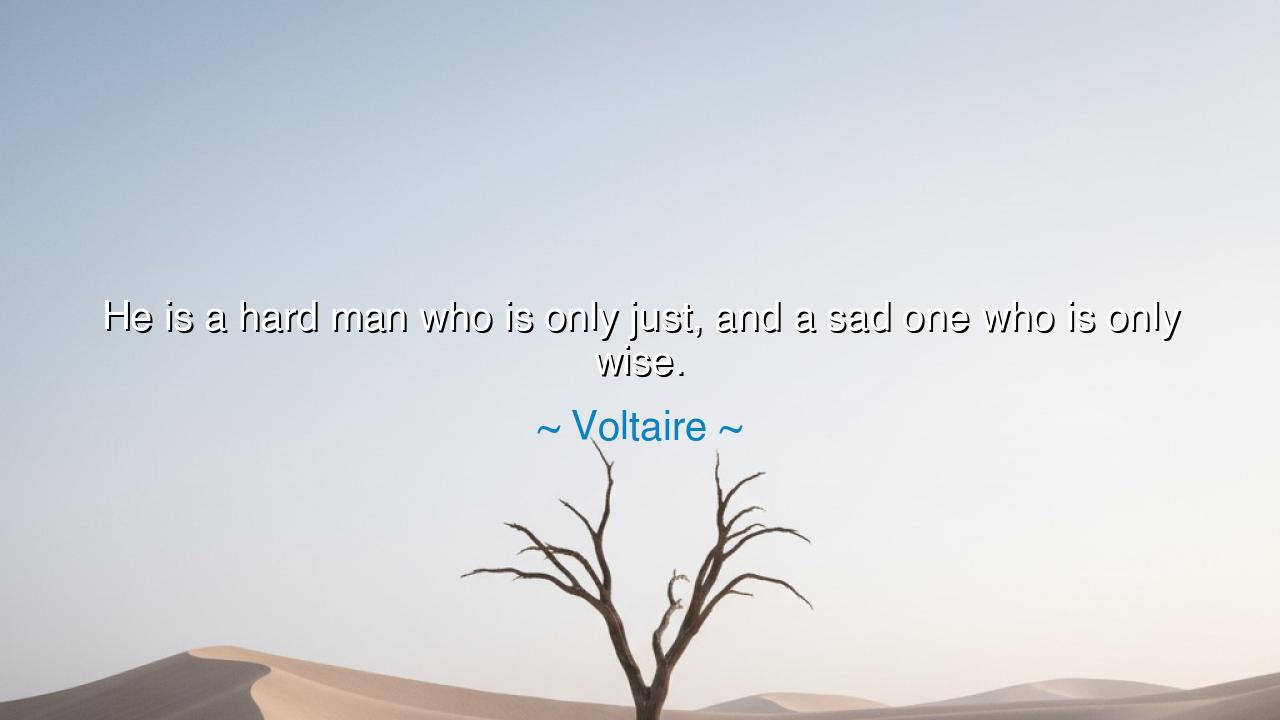
He is a hard man who is only just, and a sad one who is only






In the voice of Voltaire, that sharp mind of the Enlightenment, we hear a truth as cutting as a blade and as enduring as stone: “He is a hard man who is only just, and a sad one who is only wise.” These words, though brief, are heavy with meaning. They remind us that justice without mercy grows cruel, and that wisdom without joy turns into despair. For what is the value of being right, if one forgets to be kind? And what is the use of knowing all things, if the heart has forgotten how to rejoice?
The ancients taught that every virtue must be balanced, else it becomes a vice. The man who lives only by justice, who weighs all things coldly on the scale of law and reason, becomes as unyielding as iron. Such a man may punish wrongdoing, but he cannot heal it; he may judge, but he cannot inspire. Likewise, the man who is only wise, who sees too deeply into the sorrows and follies of the world, risks drowning in his own knowledge. For wisdom that does not lift the spirit becomes a burden too heavy to bear.
Consider the story of King Solomon, famed for his wisdom. When two women came to him, both claiming the same child, he did not merely rely on the cold letter of judgment. Instead, he used mercy and cunning together, proposing to divide the child, knowing that the true mother’s love would reveal itself. If Solomon had been only just, he might have ruled harshly, but by wedding wisdom to compassion, he revealed truth and preserved life. Here lies Voltaire’s teaching: balance makes virtue whole.
We also see this lesson in history’s darker chapters. The French Revolution, of which Voltaire was a spiritual forerunner, began with cries for justice. Yet when justice alone, without mercy, became the blade of the guillotine, it turned into terror. The men who ruled by justice alone became hard as stone, and the dream of freedom was drowned in blood. Justice, untempered by humanity, devours even its own children.
As for wisdom without joy, one might remember the figure of Arthur Schopenhauer, the philosopher who saw the world as nothing but suffering and illusion. His wisdom was deep, his reasoning brilliant, but because he lacked joy, he left behind a vision of life steeped only in sadness. Compare him to Marcus Aurelius, who also saw the world’s pain, yet taught himself to find dignity, meaning, and even serenity within it. The wise man must not only see the darkness, but also kindle a light within it.
Voltaire’s words, then, are a warning and a guide. Justice must be softened with mercy, and wisdom must be lifted with joy. For the fullness of humanity lies not in one virtue alone, but in the harmony of many. To be just without compassion is to be feared but unloved. To be wise without joy is to understand life but never taste it. The greatest souls are those who weave together the strands of justice, mercy, wisdom, and joy into one living fabric.
Therefore, take this lesson into your days: do not pride yourself on being “just” if you have forgotten to forgive. Do not call yourself “wise” if you have lost the ability to laugh, to sing, to find wonder in the simplest of things. Be both just and merciful, both wise and joyful. Seek balance, for in balance lies the path of greatness.
For in the end, the legacy of a person is not measured only by how fairly they judged or how deeply they understood, but by how fully they lived—how they made others feel seen, forgiven, and uplifted. Remember Voltaire’s words, and let them be a compass: avoid the hardness of justice alone, avoid the sadness of wisdom alone, and walk instead the middle way, where heart and mind are joined, and life becomes not a burden, but a gift.






AAdministratorAdministrator
Welcome, honored guests. Please leave a comment, we will respond soon